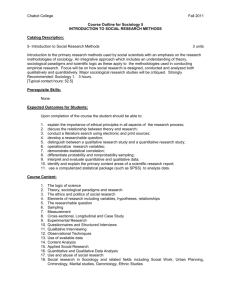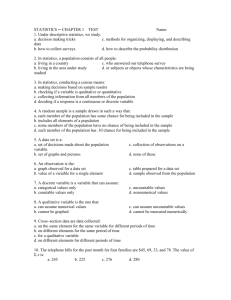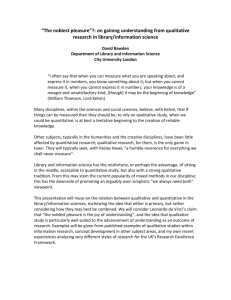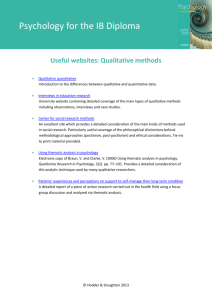This letter is a response to the Interagency Panel on Research Ethics
advertisement
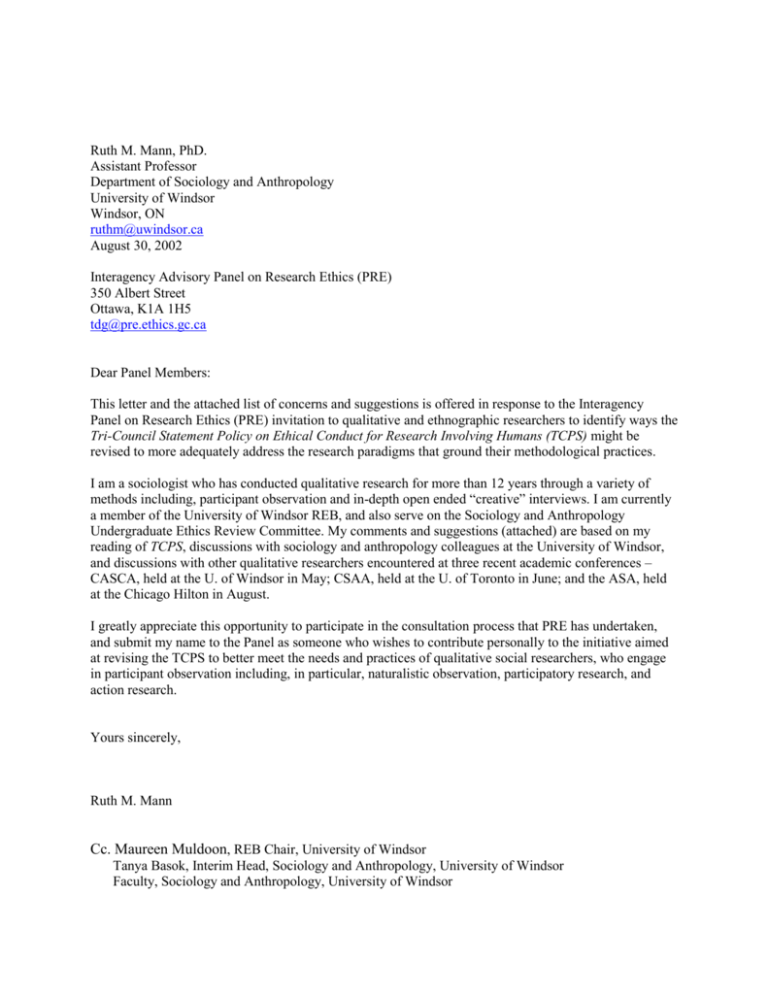
Ruth M. Mann, PhD. Assistant Professor Department of Sociology and Anthropology University of Windsor Windsor, ON ruthm@uwindsor.ca August 30, 2002 Interagency Advisory Panel on Research Ethics (PRE) 350 Albert Street Ottawa, K1A 1H5 tdg@pre.ethics.gc.ca Dear Panel Members: This letter and the attached list of concerns and suggestions is offered in response to the Interagency Panel on Research Ethics (PRE) invitation to qualitative and ethnographic researchers to identify ways the Tri-Council Statement Policy on Ethical Conduct for Research Involving Humans (TCPS) might be revised to more adequately address the research paradigms that ground their methodological practices. I am a sociologist who has conducted qualitative research for more than 12 years through a variety of methods including, participant observation and in-depth open ended “creative” interviews. I am currently a member of the University of Windsor REB, and also serve on the Sociology and Anthropology Undergraduate Ethics Review Committee. My comments and suggestions (attached) are based on my reading of TCPS, discussions with sociology and anthropology colleagues at the University of Windsor, and discussions with other qualitative researchers encountered at three recent academic conferences – CASCA, held at the U. of Windsor in May; CSAA, held at the U. of Toronto in June; and the ASA, held at the Chicago Hilton in August. I greatly appreciate this opportunity to participate in the consultation process that PRE has undertaken, and submit my name to the Panel as someone who wishes to contribute personally to the initiative aimed at revising the TCPS to better meet the needs and practices of qualitative social researchers, who engage in participant observation including, in particular, naturalistic observation, participatory research, and action research. Yours sincerely, Ruth M. Mann Cc. Maureen Muldoon, REB Chair, University of Windsor Tanya Basok, Interim Head, Sociology and Anthropology, University of Windsor Faculty, Sociology and Anthropology, University of Windsor R. Mann, University of Windsor (Sociology & Anthropology) The following comments and suggestions address questions and requests outlined in the Interagency Advisory Panel on Research Ethics (PRE) call for suggestions, issued in April and September of 2002. ISSUES AND ASSUMPTIONS THAT REQUIRE RETHINKING: There are three sets of issues/assumptions that I and many other qualitative researchers who I have conferred with find problematic, and that REBs struggle with: 1) The issue/assumption that ethical research is “scientific” in nature, which unintentionally implies/imposes a unified paradigm that fits well with biomedical and health research, but fits poorly with qualitative social research; 2) the issue/assumption that free and informed consent means written consent, which again fits well with biomedical and health research, but fits poorly with qualitative social research; 3) the issue/assumption that the same sorts of harms/benefit assessments can be applied across research disciplines and paradigms, and the related issue of criteria to be used by REBs in allocating proposals to Full, Expedited, and Departmental Review. 1. Re the assumption that ethical research is “scientific”: As framed in the TCPS, the assumption that is problematic in part because “scientific” is left undefined. A scientific model of research is characteristically understood to mean research in which a specific “phenomenon” is addressed with a specific research question or question set, grounded in a coherent theoretical position or proposition, from which hypotheses are deduced. Alternately, as described in the TCPS (Article I.1(a), it is an “undertaking” that entails “‘research’ (quotes original) that involves a systematic investigation of established facts, principles or generalizable knowledge,” in which “humans as research subjects” are involved. The TCPS does recognize non-traditional approaches to research. REBs are explicitly reminded that “there are a variety of philosophical approaches to ethical problems and that debate between various schools of thought both informs ethical decisions and ensures an evolving context for ethical approaches.” This reminder coincides with a listing of approaches that are “additional” to “traditional” research approaches, namely “feminist” and “other” types of analysis “centred on context, relationships of power and allocations of privilege that perpetuate disadvantage and inequality” (i.9). This listing of additional approaches follows upon previous and recurring statements regarding “certain types of research” in which “ethical obligations on the prerequisites, scientific validity, design and conduct of research” can and should be “tempered” (i.6).1 1 The TCPS explicitly states that ethical obligations on the prerequisites, scientific validity, design and conduct of research are “particularly evident in biomedical and health research” (i.6) but the implication is that these apply unless explicitly exempted in the document. 1 R. Mann, University of Windsor (Sociology & Anthropology) The tempering of traditional scientific standards, however, is targeted at “areas such as political science, economics, or modern history,” and “other” areas involving the “reputations” of public “organizations” or “individuals in public life.” The vast area of qualitative ethnographic research that does not directly address social policy, institutions, or public figures lies in the shadows. It is important that the TCPS recognize that qualitative research methods tend to fit poorly with either a deductive scientific model, or with generalized notion of “systematic investigation of established facts.” Rather than deductively “test” hypotheses or systematically investigate “facts” on the basis of established theory (many qualitative researchers make the point that “facts” are constructed as opposed to “out there”), qualitative researchers inductively and reflexively theorize (and may for years re-theorize) on the data that emerges from their research practices. Qualitative researchers methods are talk, observation, and interaction aimed at documenting, capturing, exploring, interpreting, giving voice to, critiquing, and in some instances collaboratively influencing or transforming the exceedingly complex and characteristically contradictory and “messy” flow or accomplishment of social/political/cultural/personal events, actions, relationships, conflicts, challenges, memories, beliefs, commitments, intentions, powers, feelings, etc., of individuals and groups. 2. With respect to informed consent: The TCPS prefers, and REBs characteristically require, that informed consent be in writing unless there is clear reason why this is not appropriate (Section 2). While the TCPS acknowledges that “In some types of research, oral consent may be preferable” (Article 2.1.d), the onus is on researchers to demonstrate that this is the case. No category of research is recognized in which oral as opposed to written consent might be the norm. This is problematic in qualitative social research, where it is commonly inappropriate and sometimes infeasible to insist that consent be in writing. Research “subjects” are often quite happy to “talk” and/or to have a researcher present and observing, but object in principle to signing a consent form. This “subject” resistance (to putting one’s name on a piece of paper that purports to guarantee anonymity) is exacerbated when research takes place over an extended period of time. The TCPS needs to recognize that qualitative researchers, ethnographers in particular, develop research relationships that may last for years, or indeed for decades. In such cases, consent to participate is commonly an ongoing negotiation. As stated in the Code of Ethics of the American Anthropological Association, “it is understood that the informed consent process is dynamic and continuous … (it is) initiated in the project design and continue(s) through implementation by way of dialogue and negotiation with those studied…(It) does not necessarily imply or require a particular written or signed form. It is the quality of the consent, not the format, that is relevant.” (Article III.A.4) 3. With respect to harms/benefits and the implications for Full, Expedited, and Departmental Review: The issue/assumption that the same sorts of harms and benefit assessments can be applied across research disciplines and paradigms, and the related issue 2 R. Mann, University of Windsor (Sociology & Anthropology) of how proposals are allocated to Full, Expedited, and Departmental Review on the basis of perceived risk of harm pose special problems for qualitative researchers, especially those that work with individuals, populations, or communities that might be defined as “problem,” “deviant,” or “vulnerable.” How are researchers and REBs to evaluate and scrutinize the risks of “talk,” interaction, and observation? Specifically, how is the “magnitude of possible harms" resulting from talking to and interacting with a researcher determined to be “no greater than implied by participation in aspects of everyday life that relate to the research” (C1, on 1.5)? As when addressing issues of scientific merit and procedure, the TCPS document acknowledges that, with respect to risks and harms, “special issues in clinical research and medical trials” require “particular scrutiny.” No guidance is provided, however, for the evaluation of harms and benefits in qualitative/ethnographic research, other than to remind REBs that policy relevant research pertinent to the reputations of institutions and public figures is not to be impeded. As a consequence, in some universities, qualitative research proposals are automatically subject to Full as opposed to Expedited review, on the assumption that risks to interviewees must be fully scrutinized. In other institutions, little scrutiny is directed to qualitative research on the assumption talk is minimally risky, as long as norms of confidentiality and privacy are respected. The TCPS stipulates that Expedited review can be carried out “within the REB structure or through departments,” providing committees or departments report to the REB, “permitting the REB to maintain surveillance over the decisions made on its behalf” (1.8). The problematics of evaluating risks and harms in qualitative social research could be alleviated were REBs encouraged to delegate responsibility for deciding which projects require Full versus Expedited review to Department committees (composed of faculty who currently serve or previously served on the REB perhaps), especially were these Departmental committees also to conduct the Expedited reviews. This sharing of responsibility with departments would also facilitate speedy review and approval of graduate research conducted in qualitative methods courses (unlike undergraduate research conducted to fulfill course requirement, these currently must go to the REB for Full or Expedited review). GAPS IN THE POLICY: THE MAJOR GAP is that no “Section” is devoted specifically to Qualitative and Ethnographic research. Many of the problems REBs have in applying the TCPS to qualitative research could be alleviated simply by writing a Section devoted to this type of research, as is the case with issues of Inclusion/Exclusion (Section 5), Research with Aboriginal Peoples (Section 6), Clinical Trials (Section 7), Human Genetics Research (Section 8), Research involving Human Gametes, Embryos or Foetuses (Section 9), and Human Tissue research (Section 10). 3 R. Mann, University of Windsor (Sociology & Anthropology) PROBLEMS WITH AMBIGUOUS, CONTRADICTORY, OR INADEQUATE WORDKING: ONE PARTICULARLY CONFUSING STATEMENT is on the tradition in the social sciences and humanities to publish results and then debate their merit with readers and reviewers, and the relevance of this tradition to harms and benefits Specifically (1.7): “Article 1.5(d) reflects the tradition in the humanities and social sciences for researchers to publish their results and then debate with their readers and reviewers the merits of what they have written. In the context of harms & benefits to research subjects, prior to starting the research the risks of censorship of ideas through peer review do not seem justified. Nothing in this section, however, shall be interpreted to mean that other relevant parts of this Policy, such as the need for REB review, interview protocols, free and informed consent and privacy are not applicable to their research.” SPECIFIC SECIONS THAT GIVE RISE TO PROBLEMS FROM YOUR PERSPECTIVE. In my view, problems with the TCPS have less to do with the wording of sections, than with a general failure to address qualitative social research. This poses difficulties for REBs, which struggle to interpret and apply principles and procedures appropriate for (intrusive and potentially lethal) biomedical research to qualitative social research. SOME SUGGESTED REFERENCES ON QUALITATIVE AND ETHNOGRAPHIC RESEARCH: Clandinin, D. Jean and F. Michael Connelly. 1994. Personal Experience Methods. In Handbook of Qualitative Research, edited by Denzin, Norman K. and Yvonna S. Lincoln. (Thousand Oaks: Sage Publications). Code of Ethics of the American Anthropological Association. (1998). Available online at http://www.aaanet.org/committees/ethics/ethics.htm. Denzin, Norman K. 1994. The Art and Politics of Interpretation. In Handbook of Qualitative Research, edited by Denzin, Norman K. and Yvonna S. Lincoln. (Thousand Oaks: Sage Publications). Fine, Gary Alan. 1993. Ten Lies of Ethnography: Moral Dilemmas of Field Work. Journal of Contemporary Ethnography 22, no. 3:267-295. Fontana, Andrea and James H. Frey. 1994. Interviewing: The Art of Science. In Handbook of Qualitative 4 R. Mann, University of Windsor (Sociology & Anthropology) Research, edited by Denzin, Norman K. and Yvonna S. Lincoln. (Thousand Oaks: Sage Publications). Guba, Egon G. and Yvonna S. Lincoln. 1994. Competing Paradigms in Qualitative Research. In Handbook of Qualitative Research, edited by Denzin, Norman K. and Yvonna S. Lincoln. (Thousand Oaks: Sage Publications). Gubrium, Jaber F. and James A. Holstein. 1998. Narrative Practice and the Coherence of Personal Stories. The Sociological Quarterly 39, no. 1:163-187. Gusfield, Joseph R. 1992. Listening for the Silences: The Rhetorics of the Research Field. In Writing The Social Text: Poetics and Politics in Social Science Discourse, edited by Brown, Richard Harvey. (New York: Aldine De Gruyter). Heyl, Barbara Sherman. 1996. Talking Across the Differences in Collaborative Fieldwork: Unanticipated Consequences. The Sociological Quarterly 38, no. 1:1-18. Richardson, Laurel. 1995. Narrative and Sociology. In Representation In Ethnography, edited by Van Mannen, John. (Thousand Oaks: Sage Publications). Strathern, Marilyn (ed.). 2000. Audit Cultures: anthropological studies in accountability, ethics and the academy. New York: Routledge. Van Maanen, John. 1995. Trade Secrets: On Writing Ethnography. In Postmodern Representations: Truth, Power, and Mimesis in the Human Sciences and Public Culture, edited by Brown, Richard Harvey. (Urbana: University of Illinois Press). Respectfully submitted, Ruth M. Mann, PhD. Assistant Professor Department of Sociology and Anthropology University of Windsor ruthm@uwindsor.ca 5 R. Mann, University of Windsor (Sociology & Anthropology) 6


